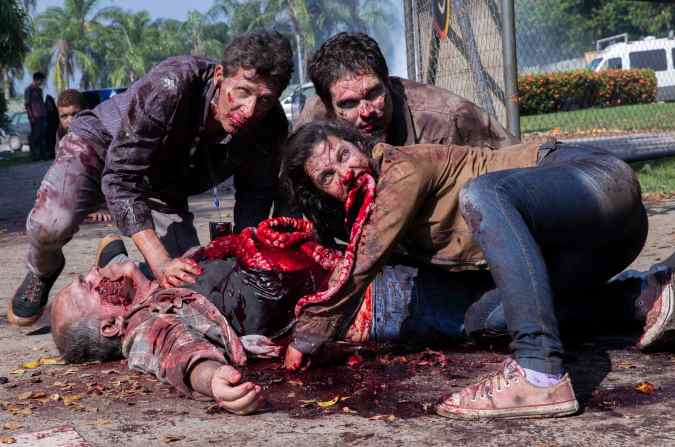There’s no shortage of zombie-themed contemporary series. Black Summer, Daybreak, Z Nation, Kingdom, Santa Clarita Diet, iZombie, The Walking Dead all have tackled the genre as of late and, for years, they have attracted large audiences. But despite the wide interest, they have become increasingly repetitive and hollow.
Based on the British series Dead Set, Netflix’s new Brazilian drama Reality Z is yet another series to explore the zombie theme, this time set in Rio de Janeiro and featuring a Big Brother inspired scenario. Few are able to achieve the mastery of social criticism of George Romero, the inventor of modern zombie stories, but in Reality Z’s case, its failure is almost as illuminating.
Like the original series created by Black Mirror’s Charlie Brooker, Reality Z tells the story of survivors of the zombie apocalypse inside a reality show program. In the case of the Brazilian series, the Big Brother look alike is Olympus, in which participants are “gods.” Each week contestants are eliminated from the program, and are thus expelled from paradise.
Despite a seemingly high budget for special effects and a lot of blood and guts, the series does not deliver what it promises — a pointed critique of the state of Brazil’s media and entertainment industry and of the country’s own reality. A confusing direction, which tries to sell the series as a Hollywood thriller, but at most manages to make us dizzy and confused by the frenetic and uncoordinated movement of cameras, along with a poor script and often lousy performances make the experience of watching the supposedly horror series an exercise in cringe-worthy comedy. Most performances look like they come directly from a Brazilian soap opera or a Mexican telenovela and, despite knowing you deserve better, you cannot look away.

Reality Z, however, has one advantage. It suffers from the same effect that led The Room, considered the worst film in the world, to become successful: It is so bad that it entertains, amuses and makes you laugh (even if involuntarily).
The plot is simple: a zombie outbreak takes over the world and, in Rio de Janeiro, the house where Olympus takes place becomes potentially the safest place to survive the apocalypse. The series, however, makes an interesting caricature of the Brazilian reality throughout the 10 half-hour episodes of the first season, even though most characters are just pure clichés: the evil boss, the coward without any personality, the brave young female character, the pretty yet dumb lady in distress, the hot-sometimes-naked bimbo, the pretty-and-I-know-it dumb with muscles. All are as deep, as they say in Brazil, as a puddle of water.
Though broadly drawn, Congressman Levi (Emilio de Melo) is one of the most interesting characters on the show. He’s a skilled negotiator who tries to stay in control and benefit from the situation and survive at all costs. As an indictment of Brazilian politics, this criticism sounds almost banal. But in the midst of the current Brazilian political crisis, he ends up serving as an allegory that portrays the situation in the country. Even without a zombie apocalypse, the country seems to have been taken over by an equally dangerous group prone to violence and incapable of thinking for themselves.
Like zombies, supporters of far-right president Jair Bolsonaro wandered the streets helping to spread Covid-19 in demonstrations in support of the president and against measures of social isolation. The best characters (and the best performances) are the policemen. To an audience not familiar with Brazil, these characters may feel almost too outlandish to feel real. Famous for slaughter, for forming militias and for being one of the most violent and lethal in the world, the image of the Military Police of Rio de Janeiro presented in Reality Z feels all too accurate.
In the midst of the protests against police violence that have taken hold of the world and are also happening in Brazil, the love-hate relationship between Corporal Robson (played by Pierre Baitelli) and Teresa (Luellem de Castro), who first appears under arrest inside Robson’s police car for filming him snorting cocaine, is perhaps the peak of the series, probably the only one.
The social criticism of the series, however, is diluted. But it is possible to draw some lessons about the human condition, greed, lust, prejudice, even though at most times they are presented as pure cliché.
The series improves in the final episodes (in fact, they look like two different series with just a tiny connection between them), managing to create some real moments of tension and expectation. And an ingredient, in the best Game of Thrones style, ends up helping audiences stay interested: No character is safe and anyone can end up dead.
Reality Z may be a bad series, but that’s exactly why it makes it worth watching.
Reality Z is now streaming on Netflix.




